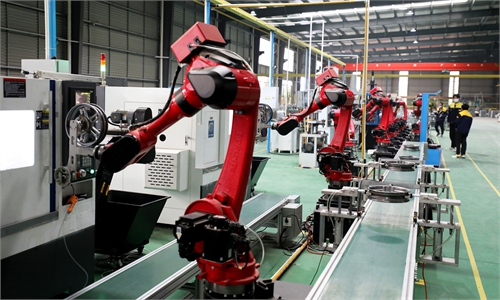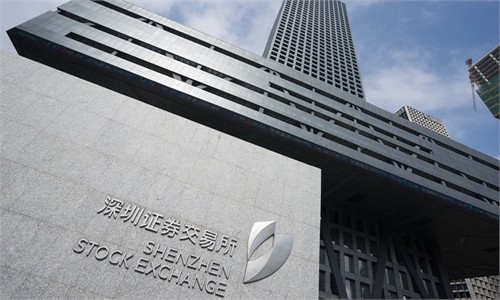Facing elevated interest rates abroad, China’s equities yearn for more reforms to maintain stability

stock market Photo:VCG
After hitting the ebb, the valuations of Chinese equities are now at a comfortable level and look increasingly attractive when compared to developed markets. Beijing's latest decision to ramp up national debt level by issuing more treasury bonds to increase investment on water conservancy and other infrastructure projects throughout the country is expected to reinforce economic recovery, which will also act as a positive factor for the stock market.However, with "higher for longer" interest rates in the US and Europe, and the need for more monetary policy easing in China, the pressure for capital outflows is likely to persist in the short term which may pose destabilizing factors for Chinese equities.
Central Huijin Investment Fund, an arm of China Investment Corp, has recently jumped to the market by increasing its holdings of Chinese equities that will likely help the A-share market to pick up momentum of growth.
Market analysts believe that investors will come back and purchase Chinese assets, as the world's second-largest economy has staved off its post-pandemic growth fatigue seen in the second quarter and has regained impetus to expand, though not at the sizzling pace the world had witnessed prior to 2018. In the third quarter this year, China's GDP grew by 4.9 percent year-on-year, much higher than the broadly estimated 4.4 percent. For the first nine months, the economy expanded by an impressive 5.2 percent.
The central government's resolve to increase fiscal stimulus by issuing an additional one trillion yuan ($137 billion) in treasury bonds to shore up the economy, and Central Huijin Investment Fund's move to buy equities on the secondary market have reinforced the policy signal of reinvigorating the capital market, which could support a sustainable market rally in the short to medium run. Following the one trillion yuan special bonds sale, the country's fiscal deficit ratio in 2023 will grow from 3 per cent to 3.8 percent of the GDP, and this year's fiscal deficit is estimated to climb to 4.88 trillion yuan.
China's equities are currently trading at the lower end of historical valuations. But the country's corporate earnings recovery is well on track with return on equity (ROE) expected to improve as the economy continues to strengthen, market observers say.
Triggered by the additional one-trillion-yuan special bonds sale and Central Huijin's move to purchase equities, China's A-share market rallied on Tuesday and Wednesday. The benchmark Shanghai Composite Index climbed by more than 1.2 percent in those two trading sessions.
In the second half of 2023 and also 2024, China's growth impulse is anticipated to be heavily tilted toward expanding investment and ratcheting up domestic consumption, buoyed by strong government and corporate investments into new technologies including semiconductors, robotics, big data and AI, solar and wind farms and other forms of green energy, as well as the ongoing explosive growth in electric vehicles.
At the same time, the country's low interest rate environment is estimated to continue for longer, in sharp contrast to the inflationary dilemma faced by other major economies. The country has maintained a low inflation environment for the past three years, which has been kept at a low single-digit range of below two percent. The central bank's reserve requirement ratio has been on a downward trend too, with the aim to provide adequate liquidity. And the loan prime rate (LPR) has also been maintained lower, reducing borrowing costs for broad businesses and individuals, which will fire up credit growth.
With regard to the much-concerned property sector, the government has rolled out a raft of supportive policies since late 2022, including policies backing up high-quality developers and the easing of home purchase restrictions in tier-1 and tier-2 megacities and sticking to lower mortgage rates that favor home buyers. The policy easing will continue in the coming 18 months in the government's attempt to bolster economic growth.
In a brief disclosure, Central Huijin stated that it has bought exchange-traded funds (ETFs) this week and will keep increasing its holdings, but it did not reveal any specific purchase amount and what it has bought. The latest purchases came shortly after the investment fund's announcement on October 11 that it ramped up its stake in the country's four largest commercial banks and plans to further boost its portfolio in the lenders in the coming months. ETFs refer to a type of investment fund that is traded on stock exchanges much like individual stocks but holds assets that are designed to track the performance of a specific index.
The market has since responded favorably. To further shore up market expectations, the Central Huijin and other state-run funds should keep on purchasing selected shares to help establish a buttress for the market. And, according to some Chinese media reports, Beijing should also consider setting up a state-backed market stabilization fund which could intervene by expanding purchase scale when it is necessary, such as in the case that the market faces persisting pressure of a capital flight.
Now, the US Federal Reserve has maintained its high interest rates, which has caused the yield of the 10-year benchmark US Treasury notes to reach 5 percent, the highest in 16 years. The prolonged high interest rates in the US has put mounting pressure on other currencies are leading to capital outflows from emerging markets, including China's. Therefore, the establishment of a state fund to stabilize China's capital market is imperative, according to market observers.
According to market tracker Wind, the A-share market saw a net 42.2 billion yuan flow-out via the stock connect programs with the Hong Kong stock exchange to date this month, amid elevated US Treasury yields which analysts said have been one of the key factors weighing on Chinese equity market. Last week, foreign investors were net sellers of $3.3 billion of A-shares. So, facing elevated interest rates abroad, the policymakers could take bolder reform measures to stop the outflow of funds and maintain stability of the capital market.
The author is an editor with the Global Times. bizopinion@globaltimes.com.cn



